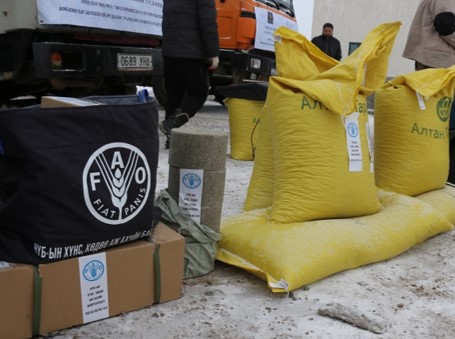Early Action to safeguard lives and livestock based livelihoods against potential Dzud in drought affected pastoralist areas

Since November 2017, using the FAO’s Special Fund for Emergency and Rehabilitation Activities (SFERA), FAO Mongolia has been implementing a pilot roject on early actions to protect key livelihood assets, in particular, to ensure the survival of pregnant animals, young stock and newborns of 504 vulnerable herder households in 5 soums of 5 aimags, where potential risks of the dzud were projected due to the adverse effects of past summer drought and pasture carrying capacity, which were exceeded many times.
To achieve the expected outcome of the project, by the end of December 2017, the beneficiary herder households were supported by access to the cash for the purchase of hay for their animals. That is, in exchange for cash, beneficiary herder households provided 19,340 kg of meat, consisting of 10,165 kg of mutton and 9,175 kg of goat meat, and as a result, beneficiary herder households received 68,845,820 MNT in their bank account as income for meat sales. The purchased 1008 the quality and safety certified frozen sheep and goat meat were distributed as food aid to urban 501 poor households, 2 temporary shelters for homeless and 1 kindergarten of orphans.
As a second action of the project, by the mid-Feb 2018, the beneficiary herder households received a nutrient balanced feed package that is intended to provide a 60-day supplementary feeding for pregnant animals and weakened young stock. The feed package included concentrate (mixed granular feed) in rich proteins and carbohydrates, as well as mineral and vitamin supplements: a mineral salt block and vitamin balanced feed additives that assure the digestibility of the feed, which stimulates the immune-system and the metabolism of nutrients in the weakened animals during critical periods of the year in areas affected by natural and climatic difficulties.
In Mongolian pastoral livestock herding system, when arise the drought-cum-dzud condition, animal access to pastures becomes difficult and with a combination of cold stress causes long-term starvation in animals, due to malnutrition, pregnant animals are often subjected to abortion, the birth of weak offspring, complications during and after delivery, lack of milk after birth and, as a result, lead to high mortality of newborns, which adversely affect the reproduction of the herd. To get healthy newborns with normal growth and development that will bring good profit to their owner, it is necessary to create adequate conditions for the care and feeding/nutrition of maternal animals during pregnancy, that is, special attention should be given in the winter months.
